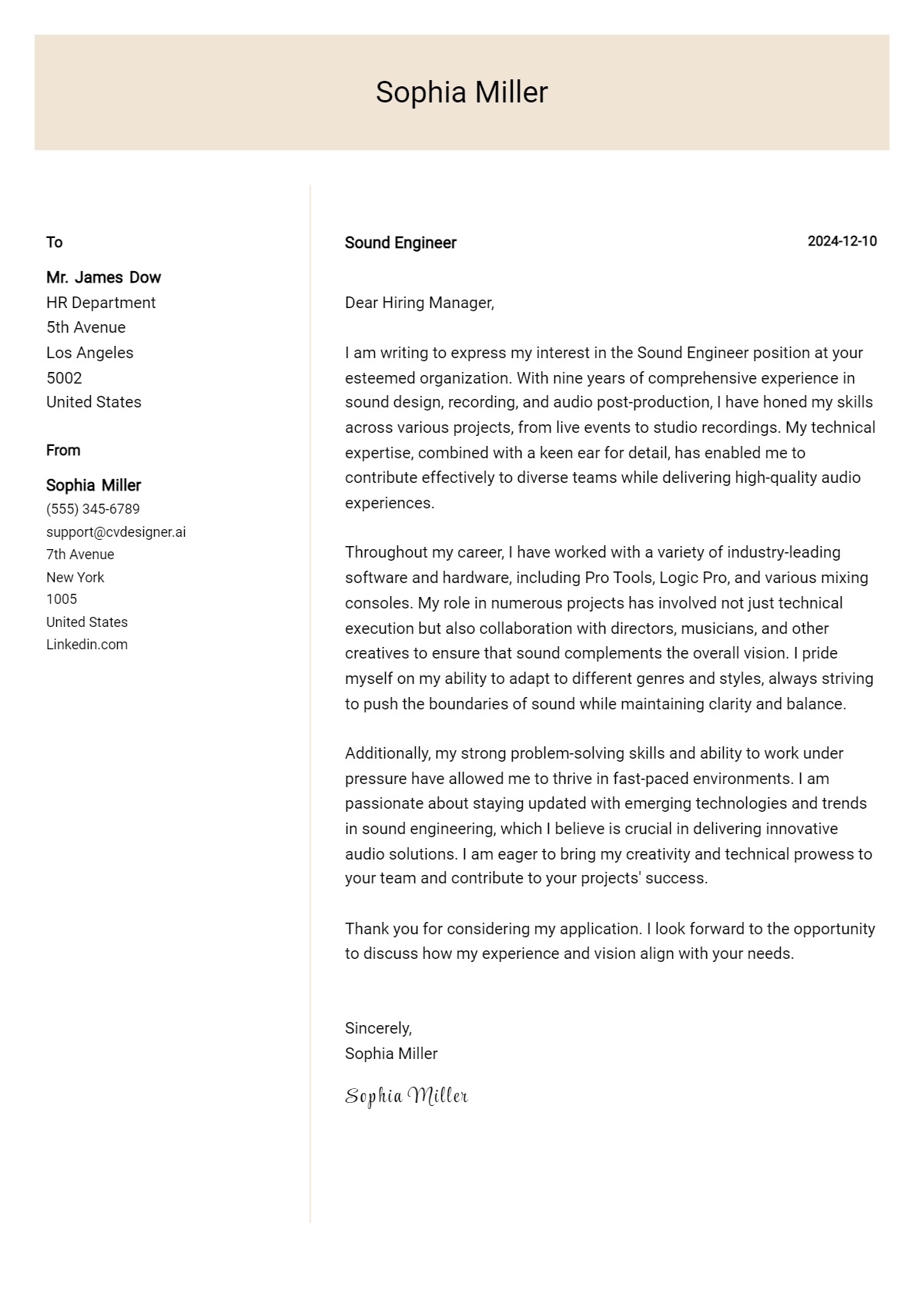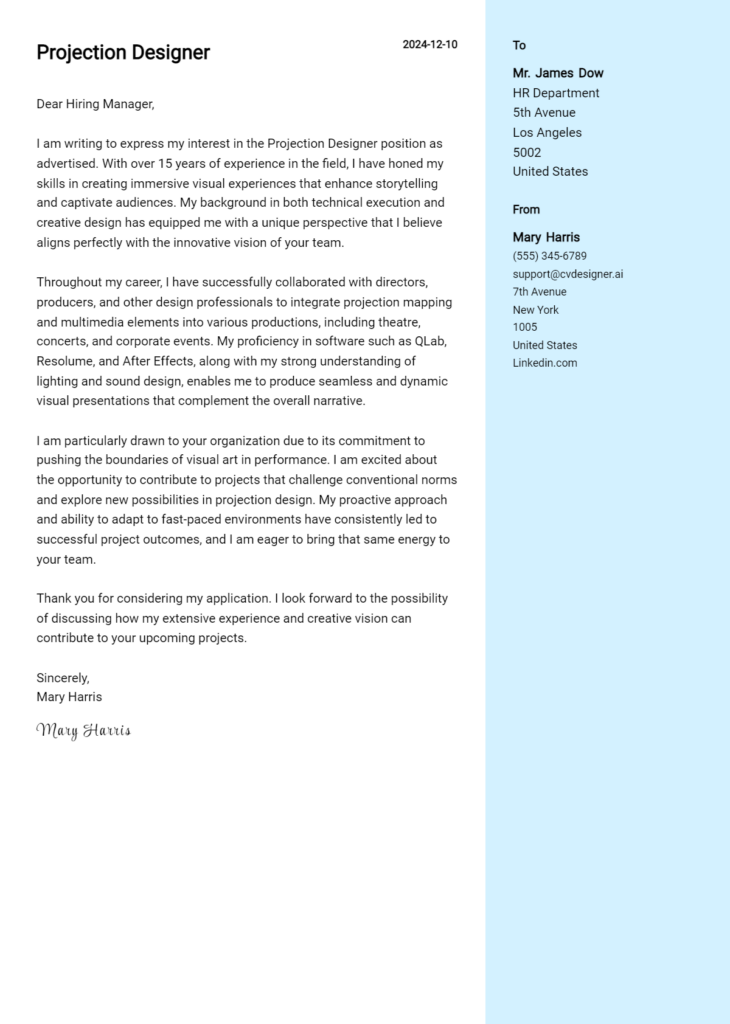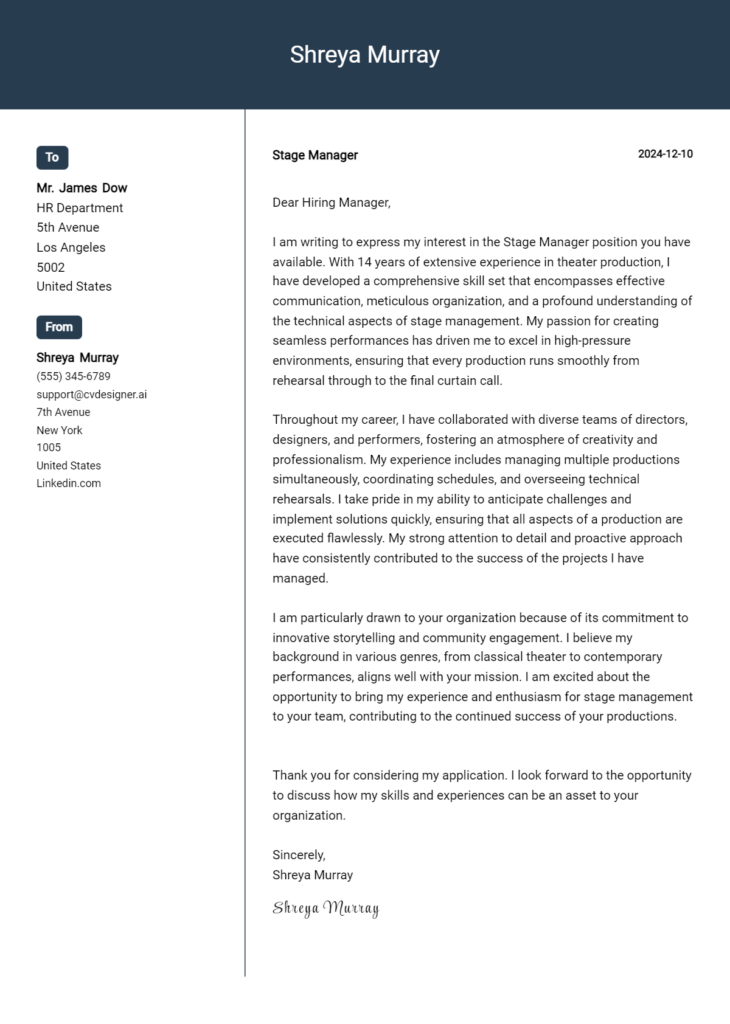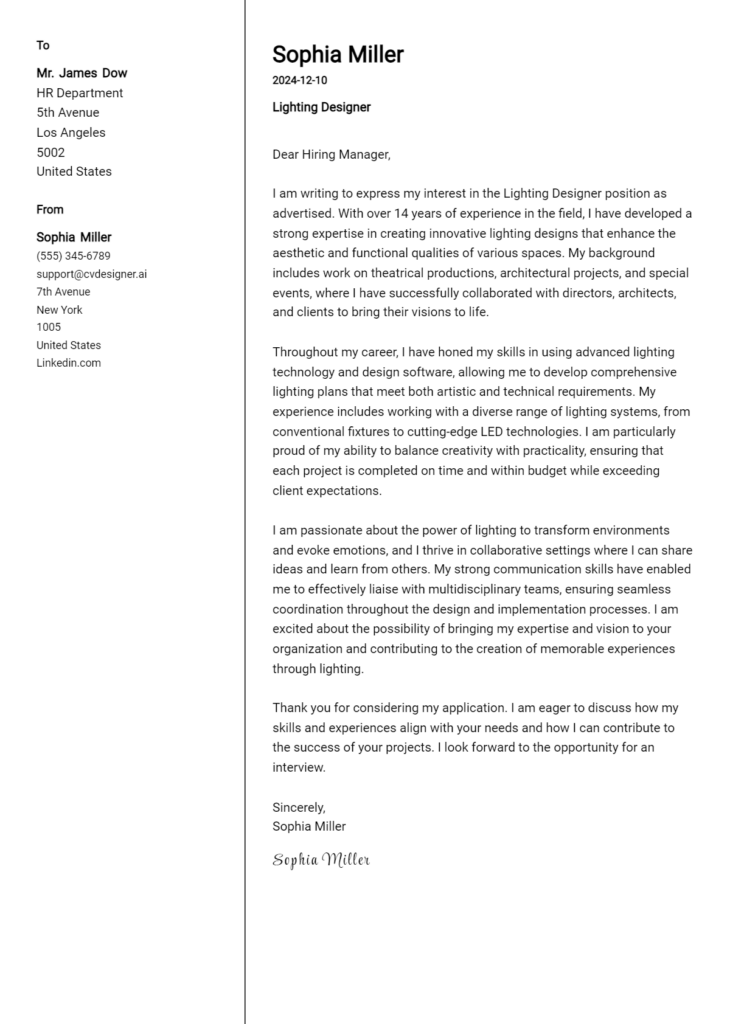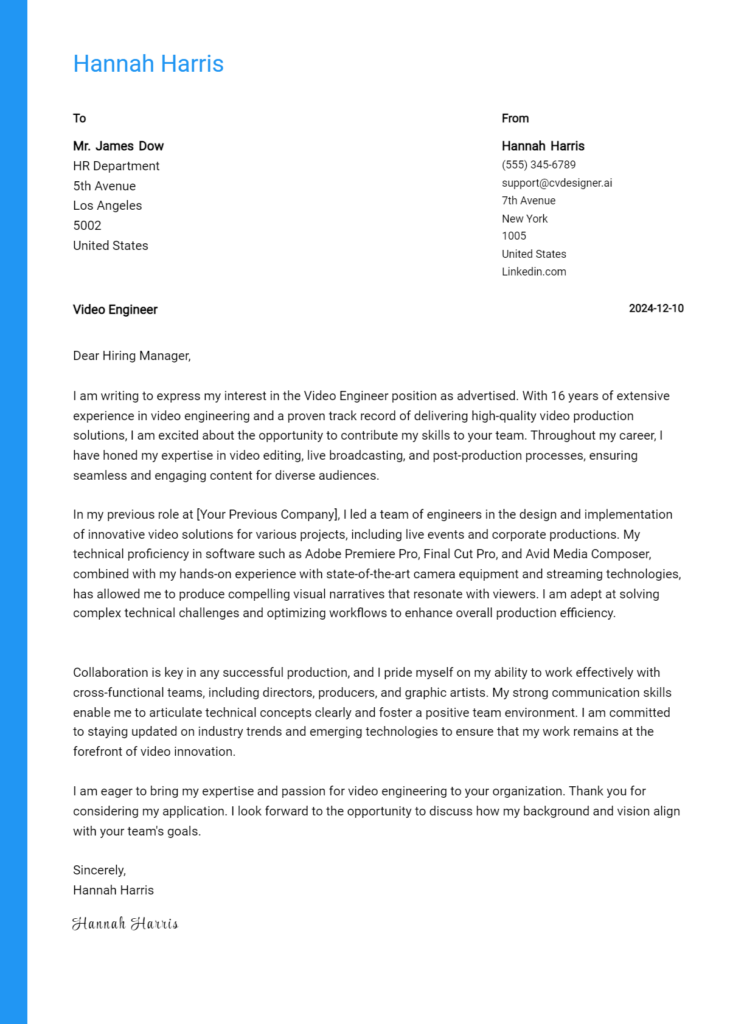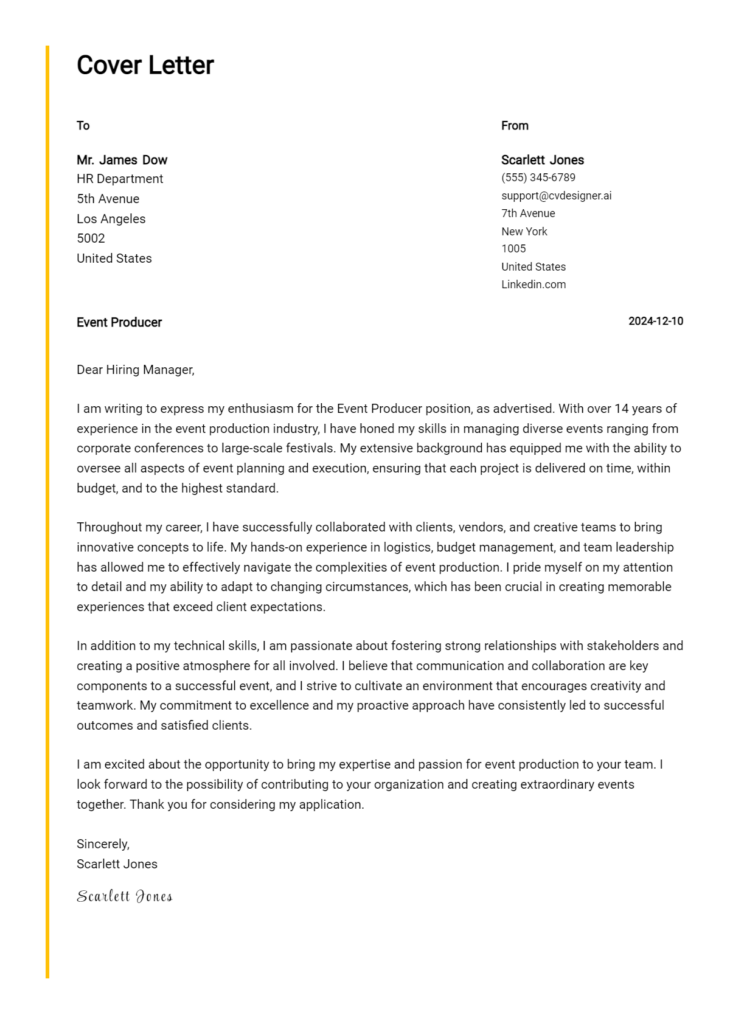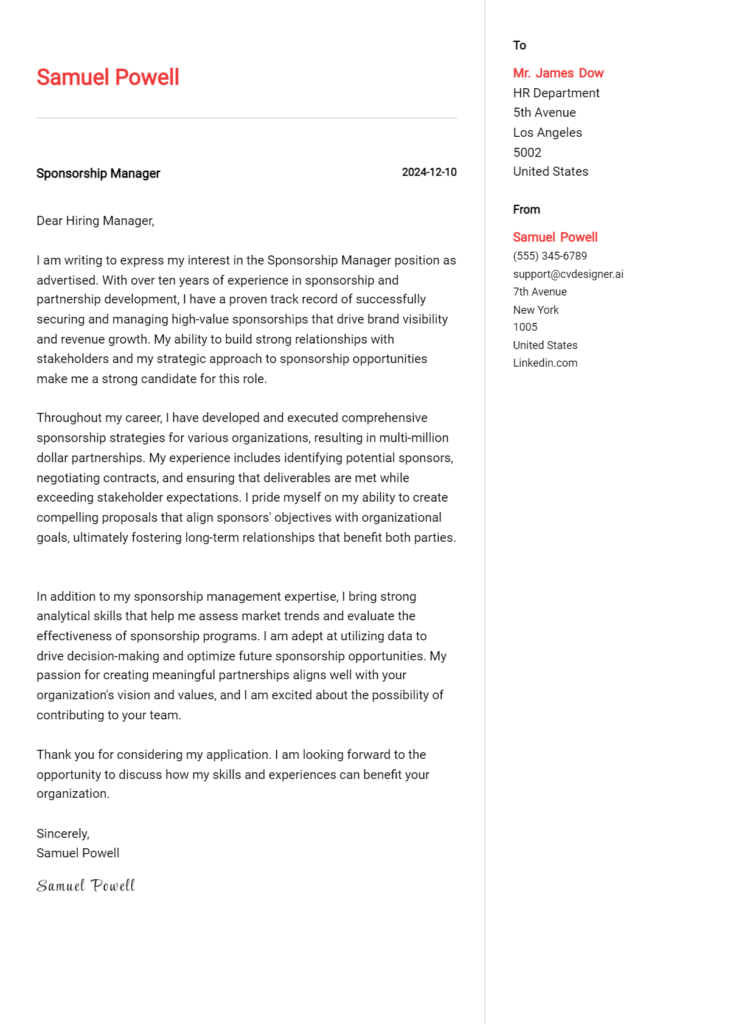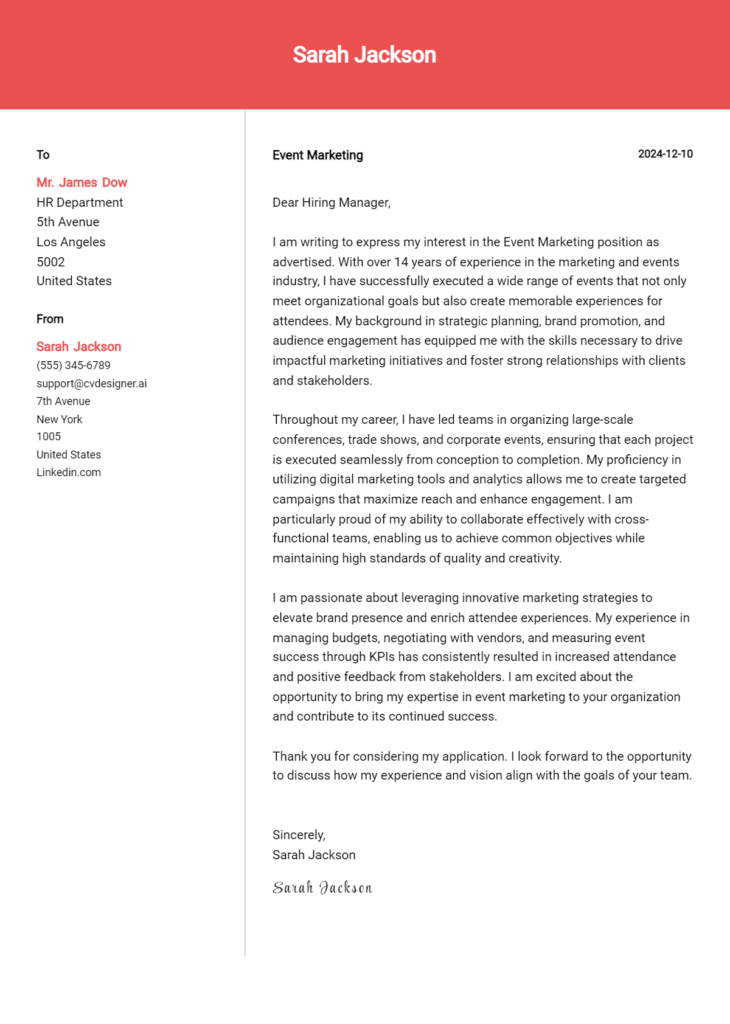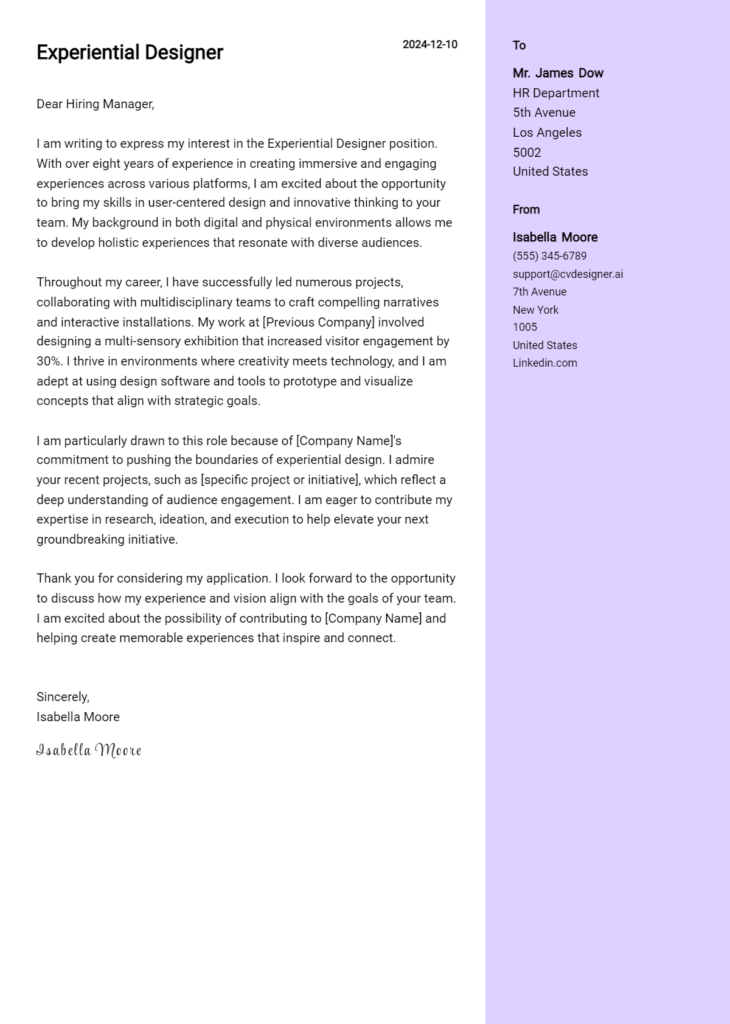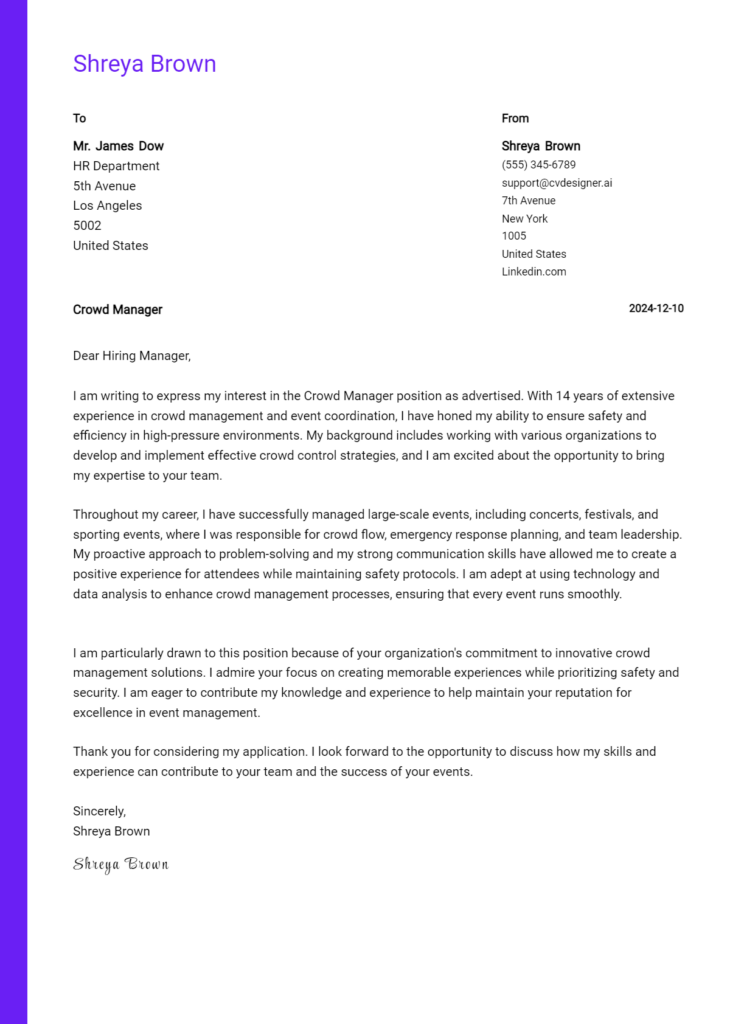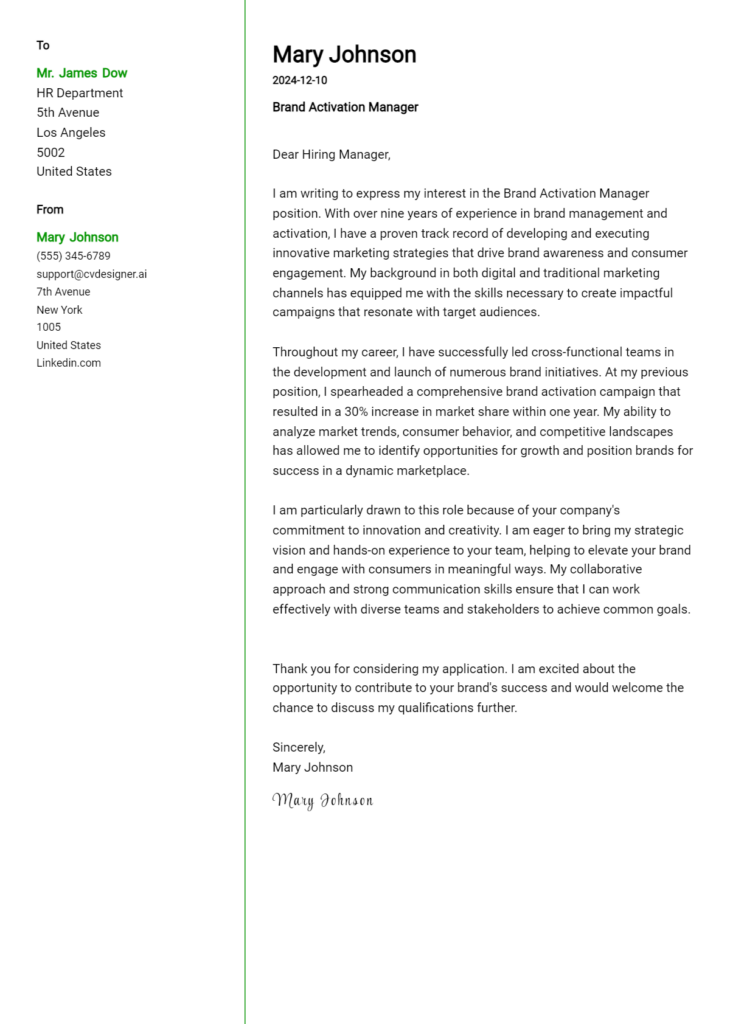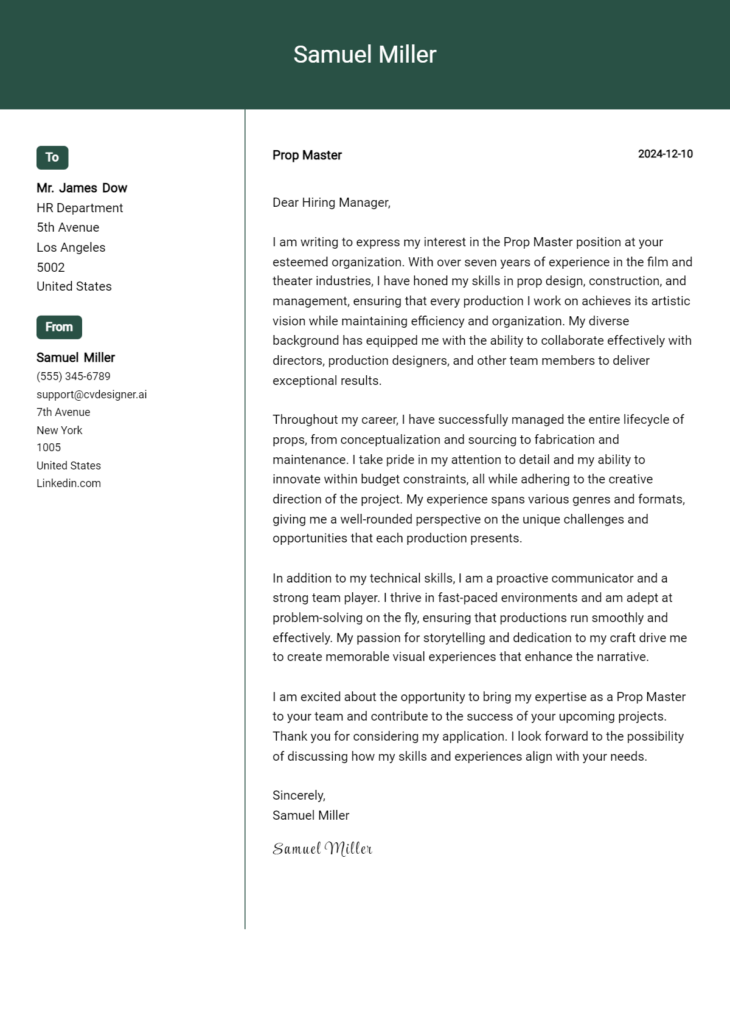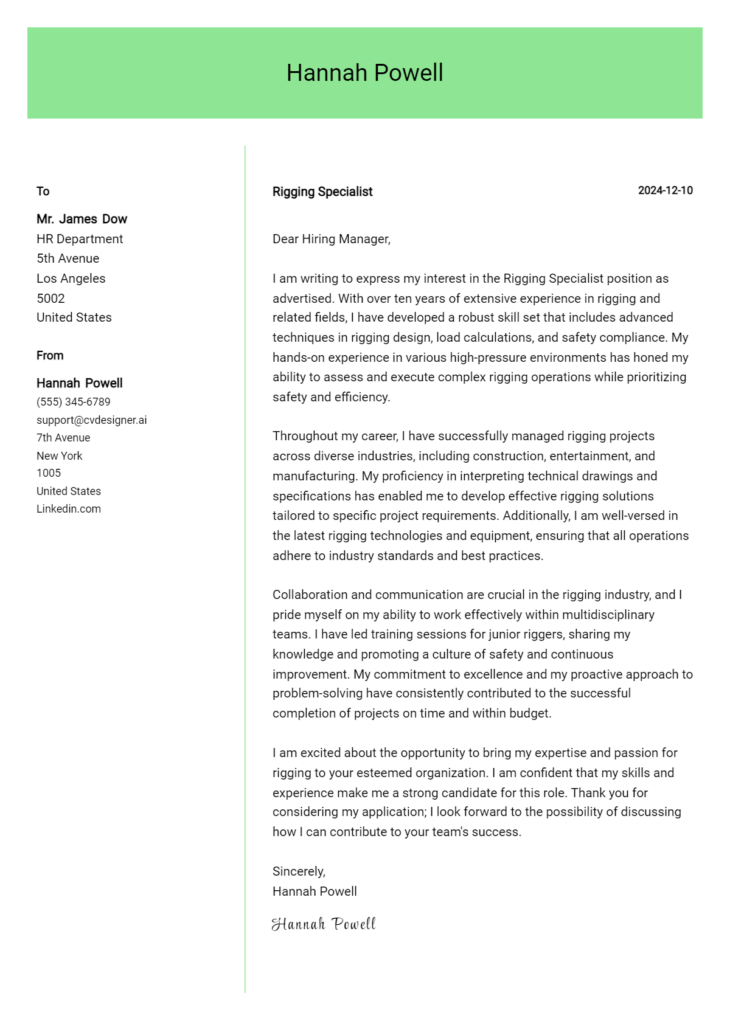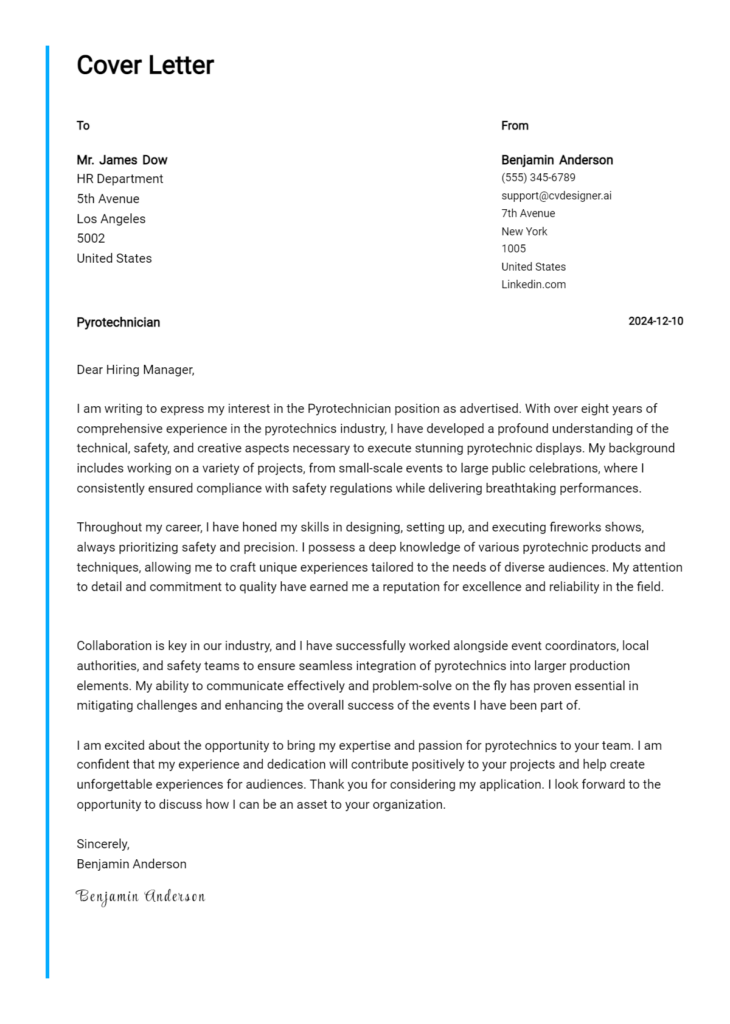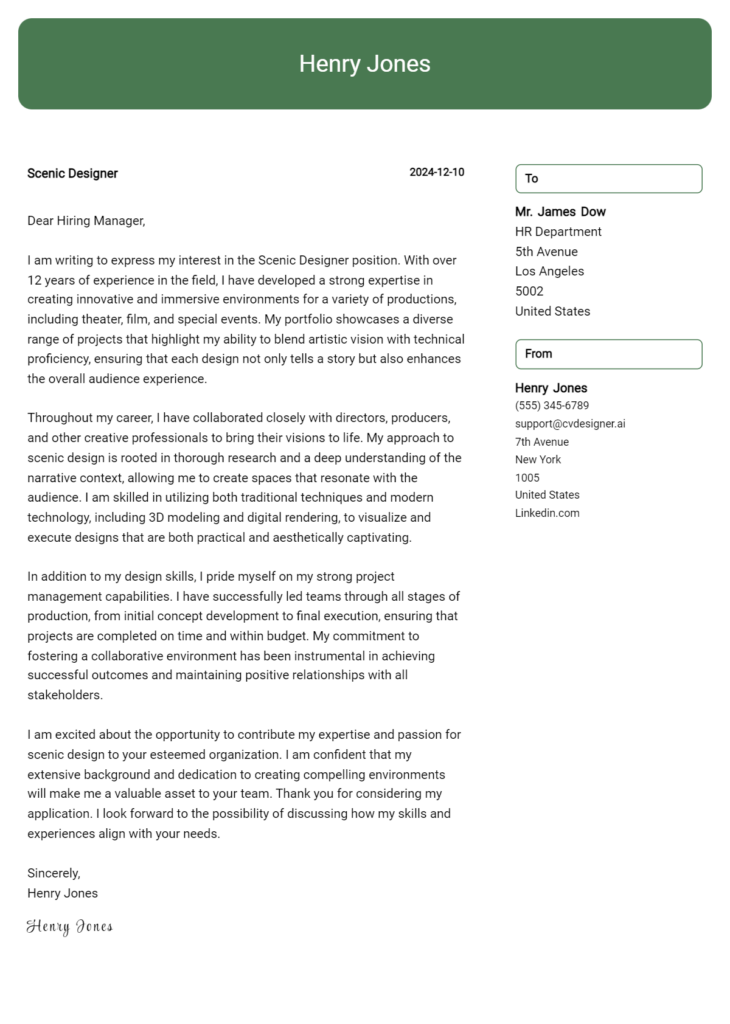Sound Engineer Cover Letter Examples
Explore additional Sound Engineer cover letter samples and guides and see what works for your level of experience or role.
How to Format a Sound Engineer Cover Letter?
Crafting a standout cover letter is essential for a Sound Engineer, as it not only conveys your technical prowess but also your creativity and ability to communicate effectively. The way you format your cover letter reflects your professionalism and attention to detail—qualities that are vital in the fast-paced world of sound engineering. A well-structured letter can capture the attention of hiring managers, showcasing your unique skills and experiences that set you apart from other candidates.
In this guide, we'll outline the key components of a professional cover letter, focusing on how to effectively present yourself as a qualified Sound Engineer. We'll delve into the essential sections, including:
- Cover Letter Header
- Cover Letter Greeting
- Cover Letter Introduction
- Cover Letter Body
- Cover Letter Closing
Each section plays a crucial role in emphasizing your qualifications and artistic vision. Let’s explore how to create a compelling cover letter that resonates with potential employers in the sound engineering field.
Importance of the Cover Letter Header for a Sound Engineer
The cover letter header is a crucial component of any professional correspondence, including for sound engineers. It sets the tone for the entire document and provides essential information to the recipient. A clear and well-structured header should include your contact information, the date, and the recipient's details. This not only helps in identifying who the letter is from and to whom it is directed but also demonstrates professionalism. An effective header enhances the overall impression of your application, while a poorly formatted one can detract from your qualifications.
Strong Example:
John Doe 123 Sound Lane Audio City, AC 12345 johndoe@email.com (123) 456-7890 October 15, 2023 Jane Smith Head of Sound Engineering Department Creative Audio Solutions 456 Music Ave Soundtown, ST 67890
Weak Example:
john d johndoe@email 10/15/23 to whom it may concern
The Importance of a Cover Letter Greeting for a Sound Engineer
The greeting of a cover letter plays a crucial role in establishing the tone for the rest of the document. It is the first point of contact between you and the hiring manager, setting the stage for how your qualifications and enthusiasm for the position will be perceived. A well-crafted greeting demonstrates professionalism and personalization, showing that you have taken the time to address the recipient directly rather than relying on a generic salutation. To make your greeting impactful, avoid using "To Whom It May Concern" or similar phrases. Instead, take the initiative to research and find the hiring manager's name if possible. This not only enhances the personal touch of your letter but also reflects your genuine interest in the position.
Strong Greeting Example
Dear Ms. Johnson,
Weak Greeting Example
To Whom It May Concern,
Importance of a Well-Crafted Cover Letter Introduction for a Sound Engineer
A compelling cover letter introduction is crucial for a Sound Engineer as it sets the tone for the entire application. This introductory paragraph should not only grab the hiring manager's attention but also convey the candidate's enthusiasm for the position. It’s an opportunity to briefly highlight key skills or relevant achievements that align with the job requirements, making it essential for standing out in a competitive field. A strong introduction can create a lasting impression, while a weak one may lead to the application being overlooked.
Strong Example
Dear [Hiring Manager's Name], As an accomplished Sound Engineer with over five years of experience in studio and live sound production, I was thrilled to discover the opening at [Company Name]. My passion for audio engineering, combined with my expertise in mixing and mastering, has allowed me to work on projects that have received critical acclaim, including [specific project or achievement]. I am eager to bring my creative skills and technical knowledge to your team and contribute to the innovative soundscapes that [Company Name] is known for.
Weak Example
Hi there, I saw your job posting for a Sound Engineer, and I think I could be a good fit. I have some experience in sound engineering, and I like music. I hope to work with you soon.
Purpose of the Cover Letter Body for a Sound Engineer
The cover letter body for a Sound Engineer serves as a crucial platform for candidates to effectively communicate their technical expertise, relevant experiences, and the unique value they can bring to a potential employer. This section should highlight specific projects, such as sound design for films, live event engineering, or studio recording work, demonstrating how these experiences have equipped the candidate with the skills necessary to excel in the role. By showcasing notable accomplishments, such as successfully mixing audio for a high-profile concert or earning accolades for innovative sound design, the candidate can illustrate their capability to contribute positively to the company's objectives.
Strong Example
As a Sound Engineer with over five years of experience in both live and studio environments, I successfully engineered sound for the award-winning indie film "Echoes of Silence," where my work was recognized at the 2022 Cannes Film Festival. My role involved collaborating closely with the director to create a unique auditory experience that enhanced the film's emotional depth. Additionally, I managed the audio for a series of large-scale concerts, including a sold-out performance at Madison Square Garden, where my precise mixing techniques were praised by both artists and critics alike. These experiences have honed my ability to adapt to various audio challenges and deliver exceptional results, making me a valuable asset to your team.
Weak Example
I have worked with sound for a few years and have done some recording and mixing. I think I would be a good fit for your company because I like music and have a decent setup at home. I have mixed some local bands and done a couple of projects, but I don't have any specific details to share. I am really passionate about sound and would love to work with you.
Importance of the Cover Letter Closing for a Sound Engineer
The closing paragraph of a cover letter plays a crucial role in reinforcing your qualifications and expressing your enthusiasm for the position. It serves as your final opportunity to leave a lasting impression on the hiring manager. A strong closing should succinctly summarize your relevant experience, reiterate your interest in the sound engineer role, and encourage the reader to take the next step, such as reviewing your resume or scheduling an interview. In contrast, a weak closing may lack clarity, fail to convey excitement, or leave the reader uncertain about how to proceed.
Strong Example
Thank you for considering my application for the Sound Engineer position at [Company Name]. With my extensive experience in audio production and my passion for creating high-quality soundscapes, I am excited about the opportunity to contribute to your team. I believe my skills in mixing and mastering, coupled with my technical knowledge, make me a strong candidate for this role. I look forward to the possibility of discussing my application further and am eager to share how I can help elevate the audio experience at [Company Name]. Please feel free to reach out to schedule an interview at your convenience.
Weak Example
I hope you consider my application. I think I would be okay for the Sound Engineer job. If you want to know more, you can look at my resume. Let me know if you want to talk.
Crafting an effective cover letter is essential for Sound Engineer candidates seeking to make a lasting impression on potential employers. A well-written cover letter not only highlights your technical skills and problem-solving abilities but also showcases your knowledge of the Software Development Life Cycle (SDLC), your capacity for teamwork, and your dedication to continuous learning. Below are five detailed tips to help you create a compelling cover letter tailored for a Sound Engineer position.
Tips for Writing a Sound Engineer Cover Letter
Highlight Your Technical Skills: Clearly articulate your proficiency with audio software, hardware, and recording techniques. Mention specific tools and technologies you’ve worked with, such as Pro Tools, Logic Pro, or Ableton Live. By showcasing your technical expertise, you demonstrate your readiness to handle the demands of the role.
Emphasize Problem-Solving Abilities: Sound engineering often involves troubleshooting complex audio issues. Use examples from your experience where you successfully identified and resolved audio problems. Describe your analytical approach and how it contributed to achieving high-quality sound in projects.
Showcase Your Knowledge of SDLC: If you have experience in the Software Development Life Cycle, briefly explain how it relates to your role as a Sound Engineer. Discuss your understanding of various stages, such as planning, development, testing, and deployment, and how this knowledge enhances your work in sound design or audio production.
Demonstrate Teamwork Experience: Sound engineers often collaborate with musicians, producers, and other technical staff. Highlight your ability to work effectively in a team setting. Share experiences where your contributions led to successful collaboration on projects, showcasing your interpersonal skills and ability to communicate effectively.
Express Your Passion for Continuous Learning: The audio industry is constantly evolving with new technologies and techniques. Convey your enthusiasm for staying updated on industry trends, attending workshops, or pursuing further education. This commitment to growth not only reflects your dedication but also positions you as a proactive candidate eager to bring innovative ideas to the team.
By following these tips, you can create a standout cover letter that effectively communicates your qualifications as a Sound Engineer. For additional resources, consider using cover letter templates or a cover letter builder to streamline your writing process.
Common Mistakes to Avoid in a Sound Engineer Cover Letter
Crafting a compelling cover letter is crucial for standing out in the competitive field of sound engineering. Avoiding common mistakes can greatly increase your chances of making a positive impression on potential employers. Here are some pitfalls to watch out for:
Generic Greetings: Using "To Whom It May Concern" can make your application feel impersonal. Instead, address your letter to a specific hiring manager when possible.
Lack of Tailoring: Failing to customize your cover letter for the job can be detrimental. Highlight relevant skills and experiences that match the specific job description.
Overly Technical Language: While it's important to showcase your expertise, avoid jargon that may not be understood by all readers. Use clear language to explain your skills.
Ignoring the Format: A cluttered or unprofessional layout can distract from your message. Follow a cover letter format that is clean and easy to read.
Focusing on Responsibilities Instead of Achievements: Instead of listing job duties, emphasize your achievements and how they contributed to past projects. Quantifiable results can make a stronger impact.
Neglecting Proofreading: Typos and grammatical errors can undermine your professionalism. Always proofread your letter or have someone else review it before submitting.
Too Long or Too Short: Striking the right balance in length is key. Aim for a concise letter that captures your qualifications without overwhelming the reader. For examples, check out these cover letter examples.
By avoiding these common mistakes, you can create a polished and effective cover letter that showcases your skills as a sound engineer and captures the attention of hiring managers.
Cover Letter FAQs for Sound Engineer
What should I include in my cover letter as a Sound Engineer?
When writing a cover letter as a Sound Engineer, start by introducing yourself and stating the specific position you’re applying for. Highlight your relevant experience, such as projects you've worked on, types of equipment you're proficient with, and any specific genres of music or audio work. Include examples of how your skills have contributed to successful outcomes in past roles, such as improving sound quality or enhancing live performances. Additionally, express your passion for sound engineering and your enthusiasm for the opportunity to work with the company. Finally, ensure you mention any relevant certifications or education, and close with a call to action, inviting the hiring manager to discuss your application further.
How can I showcase my technical skills in the cover letter?
To effectively showcase your technical skills in your cover letter, be specific about the audio software and hardware you are proficient in, such as Pro Tools, Logic Pro, or various types of microphones and mixing consoles. Use specific examples that demonstrate how you've applied these skills in real-world scenarios. For instance, mention a project where you successfully mixed sound for a live event or recorded audio for a film. Additionally, you can include any certifications or courses you've completed that pertain to sound engineering. This not only highlights your expertise but also shows your commitment to continuous learning in the field.
Should I tailor my cover letter for each job application?
Yes, tailoring your cover letter for each job application is crucial. Each audio engineering position may focus on different aspects of sound engineering, such as live sound, studio recording, or post-production audio. By customizing your cover letter, you can highlight the specific skills and experiences that align with the job description. Research the company and its projects to understand what they value in a Sound Engineer. Mention any relevant experience that directly correlates with their needs, and explain why you are particularly excited about the opportunity to work with them. This personalized approach can significantly increase your chances of making a positive impression.
How should I format my cover letter as a Sound Engineer?
Your cover letter should follow a professional format to make a strong impression. Start with your name and contact information at the top, followed by the date and the employer's contact information. Use a standard font like Arial or Times New Roman in 10-12 point size for readability. Begin with a formal greeting, such as "Dear [Hiring Manager's Name]." Use clear paragraphs to structure your content: an introduction, body paragraphs detailing your experience and skills, and a conclusion. Keep your cover letter to one page, and ensure there are no spelling or grammatical errors. Finally, close with a professional sign-off, such as "Sincerely," followed by your name.
Build your Cover Letter in minutes
Use an AI-powered cover letter builder and have your letter done in 5 minutes. Just select your template and our software will guide you through the process.

